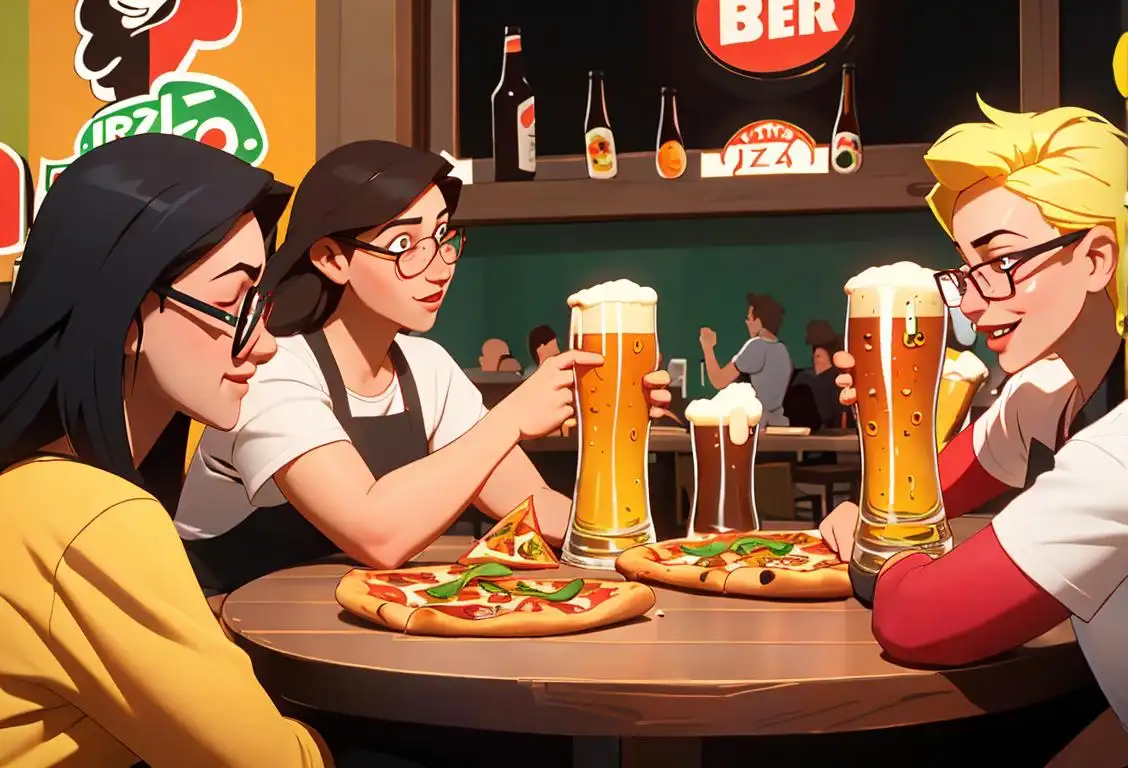National Pizza And Beer Day

Hey there, pizza lovers and beer enthusiasts! Get ready to celebrate because today is National Pizza and Beer Day! It's a match made in culinary heaven, where cheesy slices meet ice-cold brews. So grab a slice, crack open a cold one, and let's dive into the delicious history of this fantastic national day.
When is Pizza And Beer Day?
It's national pizza and beer day on the 9th October.
A Match Made in Foodie Heaven: The Origin of National Pizza and Beer Day
National Pizza and Beer Day is a culinary celebration that brings together two of life's greatest pleasures - pizza and beer. While the exact origins of this mouthwatering pairing are a bit fuzzy, it's safe to say that people have been enjoying this dynamic duo for centuries.
Pizza, with its perfect combination of dough, sauce, and toppings, has been a beloved dish since ancient times. The birthplace of pizza is often credited to Naples, Italy, where thin-crust pizzas topped with tomatoes, mozzarella cheese, and other delicious ingredients started gaining popularity in the late 18th century.
On the other hand, beer has a long and storied history dating back over 7,000 years. It's been enjoyed by countless civilizations around the world, from the ancient Egyptians to the monks of medieval Europe. Beer has always been a staple in celebrations, adding a bubbly and refreshing touch to any occasion.
It didn't take long for pizza and beer to find each other and create a match made in foodie heaven. The combination became a popular choice among friends gathering for a casual meal, sports fans cheering on their favorite teams, and even couples enjoying a cozy evening at home.
How to Celebrate National Pizza and Beer Day
Celebrating National Pizza and Beer Day is as easy as pie (or pizza, in this case) and as refreshing as a cold pint. Here are a few ideas to make the most of this delectable day:
- Head to your favorite local pizzeria and order your go-to slice. Whether you're a fan of classic cheese or adventurous with exotic toppings, there's a pizza for everyone's taste buds.
- Pair your pizza with a perfectly matched beer. From hoppy IPAs to robust stouts, there's a beer style that complements every type of pizza. Experiment with different combinations and find your personal favorite.
- Organize a pizza and beer tasting party with your loved ones. Have each person bring a different pizza and beer pairing, and have fun comparing flavors and sharing your newfound favorites.
- Explore the world of homemade pizza and beer brewing. Spend the day in the kitchen whipping up dough and sauce, and later, enjoy the fruits of your labor while sipping on your very own homemade beer.
However you choose to celebrate, remember to savor each bite and sip. National Pizza and Beer Day is all about indulgence and enjoying life's simple pleasures.
History behind the term 'Pizza And Beer'
1871
The Birth of Pizza
In the year 1871, the term 'pizza' emerged from the bustling streets of Naples, Italy. Originating as a dish made from flatbread topped with ingredients like olive oil, tomatoes, cheese, and herbs, pizza quickly gained popularity among locals as a delicious and affordable meal. It was commonly sold in street markets and eaten as a quick snack.
1889
Origin of the term 'pizza'
The term 'pizza' originated in 1889 when Queen Margherita of Italy visited Naples and enjoyed a special dish prepared by Raffaele Esposito, a renowned Neapolitan pizzaiolo. The dish consisted of a flatbread topped with tomatoes, mozzarella cheese, and basil, representing the colors of the Italian flag. Queen Margherita loved the dish, and Esposito named it after her, calling it 'Pizza Margherita'. This marked the popularization of the term 'pizza' as a specific type of flatbread with various toppings.
1889
Birth of Margherita pizza
In the year 1889, the queen consort of Italy, Queen Margherita, visited Naples. To honor her, a local pizzaiolo named Raffaele Esposito created a pizza with the colors of the Italian flag: red tomatoes, white mozzarella cheese, and green basil. This classic pizza, known as Margherita pizza, became a favorite of Queen Margherita and gained popularity throughout Italy.
1920
Prohibition and Speakeasies
The year 1920 marked the start of Prohibition in the United States, which lasted until 1933. During this period, the sale, production, and distribution of alcoholic beverages were prohibited, giving rise to secret drinking establishments known as speakeasies. These underground venues often served pizza alongside other delectable dishes. As the demand for beverages skyrocketed, speakeasies saw the potential in pairing pizza with beer, leading to the birth of the 'pizza and beer' tradition.
1920s
Pizza in the United States
In the 1920s, Italian immigrants started bringing their traditional pizza recipes to the United States. It was initially popular among Italian communities in cities like New York, Chicago, and Philadelphia. However, pizza was still largely unknown to the general American public at this time.
1940s
Surge in popularity of 'pizza' in the United States
In the 1940s, 'pizza' gained popularity in the United States, particularly among Italian immigrants and soldiers returning from World War II. Many Italian-American entrepreneurs started pizzerias and introduced the American public to this delicious dish. As the demand grew, pizza became a staple in American culture, with various regional styles emerging, such as New York-style, Chicago deep-dish, and Neapolitan-inspired pizza. The term 'pizza' became synonymous with a flavorful combination of dough, sauce, cheese, and toppings.
1943
Pizza gains popularity in the US
During World War II, American soldiers stationed in Italy discovered the deliciousness of pizza. They developed a taste for it and wanted to enjoy it back home. As a result, the demand for pizza in the United States increased, and Italian immigrants began opening pizzerias outside of their communities, introducing pizza to a wider audience.
Ancient times
Early origins of beer
Beer, a fermented alcoholic beverage, has a long history that dates back to ancient times. Its origins can be traced to civilizations such as Mesopotamia (modern-day Iraq) and ancient Egypt. These early civilizations developed methods to cultivate grains, allowing them to ferment into beer through the action of wild yeasts. Beer quickly became a vital part of their cultural and religious practices, and its consumption spread across different regions.
1940s
Pizza's American Popularity
In the 1940s, American soldiers stationed in Italy during World War II developed a taste for pizza. When they returned home, they craved the Italian delicacy, which opened the doors to pizzerias across the United States. As pizza became a mainstream food in America, it slowly became synonymous with casual gatherings, relaxing evenings, and a perfect companion to a refreshing pint of beer.
1516
The Reinheitsgebot and beer purity standards
In 1516, the Bavarian Beer Purity Law, known as the Reinheitsgebot, was enacted in Germany. This law stated that beer could only be brewed using three primary ingredients: water, barley, and hops. The Reinheitsgebot aimed to ensure the quality and purity of beer by prohibiting the use of additives and other grains. This law set the foundation for modern brewing practices and remains influential in the beer industry, particularly in Germany.
1950s-1960s
Pizza chains and commercialization
In the 1950s and 1960s, pizza chains like Dominos and Pizza Hut emerged, bringing the convenience of fast-food pizza to the American public. This marked the beginning of commercialization and mass production of pizza. Pizzerias spread across the nation, becoming a popular dining option.
1950s
Rise of Bars and Pubs
During the 1950s, bars and pubs began to embrace the 'pizza and beer' combo as a winning combination. The relaxed atmosphere of these establishments made them ideal places for friends to gather, socialize, and enjoy a slice of pizza with an ice-cold beer. The notion of pairing the two started gaining traction, solidifying the term as a cultural phenomenon.
1970s-present
Pizza and beer culture
In the 1970s, a cultural phenomenon emerged in the United States, where pizza and beer became intrinsically linked. Enjoying a slice of pizza with a cold beer became a popular social activity, whether at pizzerias or at home while watching sports or movies. The combination of pizza and beer created a casual and relaxed dining experience shared among friends and family.
1970s
Pizza Delivery and Party Culture
The advent of pizza delivery in the 1970s revolutionized the way people enjoyed pizza. With the convenience of having pizzas delivered straight to their doorsteps, the popularity of hosting pizza parties soared. This era also embraced the notion of beer as an essential accompaniment to social gatherings. 'Pizza and beer' became a staple combination at parties, further solidifying its place in pop culture.
1960s
The popularity of 'pizza and beer'
In the 1960s, 'pizza and beer' became a popular food and beverage combination in the United States, especially among young adults. The casual dining experience of enjoying a slice of pizza with a cold beer resonated with the laid-back culture of the era. It became a common pairing for social gatherings, sporting events, and nights out with friends. 'Pizza and beer' became synonymous with a carefree and enjoyable way to unwind.
Present
Continuing as an Iconic Pairing
Today, 'pizza and beer' remains an iconic pairing known for its ability to bring people together. Whether enjoyed at restaurants, bars, or in the comfort of our own homes, the combination of a savory pizza topped with flavorful ingredients and a frosty glass of beer continues to be a beloved tradition worldwide. It symbolizes relaxation, comfort, and the joys of sharing a good meal with friends, serving as a testament to the enduring cultural impact of this delectable duo.
Did you know?
Did you know that the Guinness World Record for the highest pizza spin was set in 2006? Stretching an impressive 24 feet and 9 inches in diameter, the record-breaking pizza spin was achieved by Tony Gemignani, a renowned pizza chef from the United States.Tagged
food fun loved ones sportsFirst identified
9th October 2016Most mentioned on
9th October 2019Total mentions
155Other days
One Day
Action Day
Bowling Day
Trivia Day
Suicide Prevention Month Day
Opposite Day
Happiness Day
Foundation Day
Drink A Beer Day
Awareness Day









